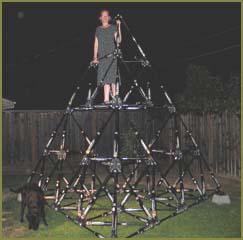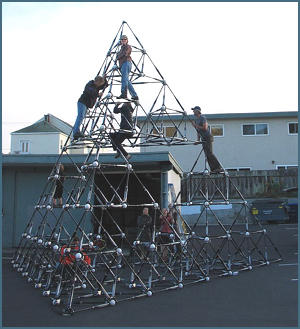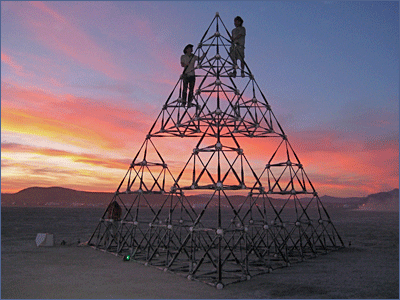Bat Country as of July, 2008
. . .

Copyright 2008 Gwen Fisher and Paul Brown.
(All images reprinted with permission. )
|
"I thought some of you might be interested
to see a mathematical art project I am in the process of building.
I am working on a 21' high, Generation 3 Sierpinski
tetrahedron made from 384 baseball bats, 130 baseballs, and about 2000
lbs of steal.
We call it Bat Country.
So far, we have constructed a Generation 2
Sierpinski tetrahedron with 96 bats, shown here with me standing on it.
"
g. l. f.
|
|
.
. .and as of August, 2008, a Generation 3 tetrahedon

Gwen is at the top.
|
. . . and in the
desert.

More
photos from Bat Country.
|
|
|
For
all viewers . . . .
The tetrahedron is one of five
Platonic solids studied at the Academy in Athens. In the 18th
century, Euler added his well-known formula V + F - E = 2 (Vertices + Faces - Edges = 2 ). However, it has been chemistry, biology and
computer graphics that have brought the study of tetrahedral forms to
major prominence in the past century. Hybrid
artists/mathematicians such as Escher joined the pursuit.
In mathematics, the topic falls under the general name of "abstract
space." As
early as 1915, Sierpinski described a "gasket" or a "triangle" with
repeated and proportionally reduced areas. Today these shapes are
widely known as "fractals." Sierpinski's triangles have emerged
to be among the most recognizable shapes or patterns in all computer
graphics.
Other projects in the
NCB . . .
"Quilts"
based on Cayley
table patterns is another project introduced by Dr. Fisher.
Fisher,
Gwen L., The
Quaternions
Quilts,
FOCUS, The Newsletter of the Mathematical Association of
America,
vol. 25 (4), January, 2005, p. 4.
Diana
Venters and
Elaine K. Ellison are both mathematicians and avid quilters.
Diana Venters and Elaine Krajenke Ellison,
Mathematical Quilts, Key Curriculum Press, 1999.
(ISBN 1-55953-317-X)
|
|
|
|